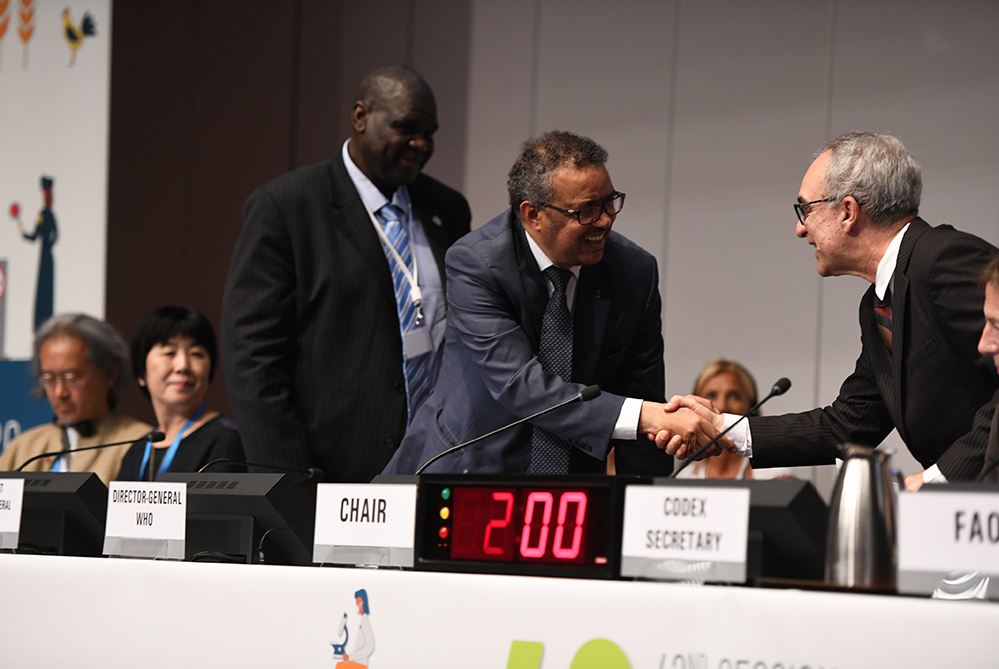Codex standards and guidelines critical in ensuring people have healthy diets and safe food
“For 56 years, the Codex Alimentarius Commission has played a vital role both in protecting the health of consumers, and in ensuring fair practices in the food trade”, said Tedros Adhanom Ghebreyesus, WHO Director-General, welcoming delegates to the forty-second session of the Codex Alimentarius Commission which is taking place in Geneva, Switzerland, 8-12 July 2019.
Codex standards and guidelines have a critical role to play in ensuring people have healthy diets and safe food and they are as important as ever in protecting people from unhealthy diets and contaminated food, and in supporting the achievement of the Sustainable Development Goals. “All countries have a duty to ensure that Codex standards and guidelines are developed and updated to achieve these goals”, Tedros said.
In describing the major organizational transformation taking place at WHO, the Director-General highlighted the creation of a science division “to ensure the advice we give the world is based on the best evidence and the most up-to-date science”, because the international food standards produced by the Codex Alimentarius Commission “are among the most important global public goods WHO produces, together with FAO”, he said.
Bukar Tijani, Assistant Director General, FAO said, “every person in every country deserves safe food and therefore every country should be able to participate effectively in the work of the Codex Alimentarius Commission”. An increasingly globalized world with annual food exports currently in excess of USD 1.6 trillion and complex food systems demands international cooperation across all sectors to ensure food is safe. Tijani called for strengthened regulatory, scientific and technological capacities at all levels across the food chain, and for a shift towards more sustainable patterns of food production and consumption. “The standards of the Codex Alimentarius are necessary to underpin these efforts”, he said.
Codex standards are a cornerstone of food safety in a changing world and “should support the transition to more sustainable patterns of food production and consumption in order to end hunger and all forms of malnutrition by 2030, said Tijani.

Left to Right Bukar Tijani, Tedros Adhanom Ghebreyesus and Guilherme da Costa
Guilherme da Costa, Chairperson of the Codex Alimentarius Commission underlined the importance of food safety and trade in achieving food security. “We cannot have food security if the sufficient amount of food is not safe. Equally, we cannot have food security if we cannot trade sufficient safe food from production to consumption areas”, he said.
As a risk-management organization, the Codex Alimentarius “must have science as its basis”, said da Costa. He described the work developed by the scientific FAO/WHO expert groups as of paramount importance for Codex and that “Codex Alimentarius has the power to achieve better and fairer food trade globally”.
Read more
The agenda and working papers of CAC42
Photo credit
© FAO/Bob Scott
Categories
- (11)
- (3)
- Animal Feed (8)
- Antimicrobial Resistance (39)
- Antimicrobial Resistance (78)
- CAC46 (15)
- Codex Texts (20)
- Codex Trust Fund (1)
- Codex60 (19)
- Contaminants (13)
- Contaminants (10)
- COVID-19 (64)
- Elections (6)
- Food Safety (126)
- Labelling (10)
- Nutrition and Labelling (5)
- Nutrition and Labelling (7)
- Observers (23)
- Pesticides (7)
- Standards (78)
- World Food Safety Day (154)


